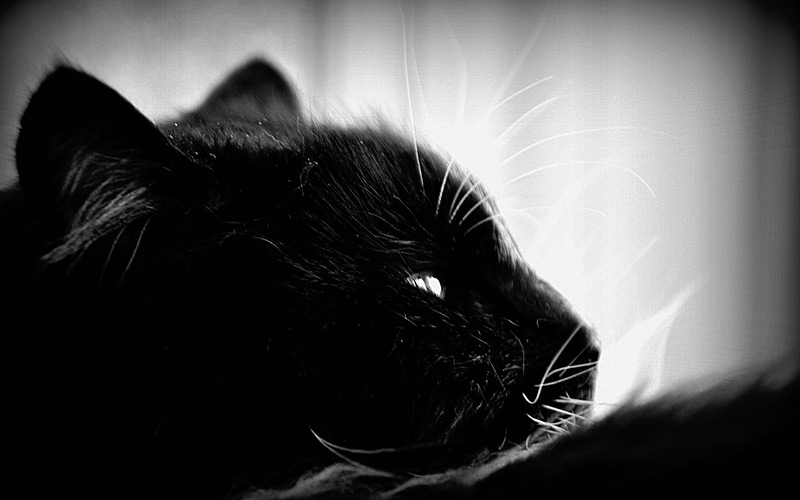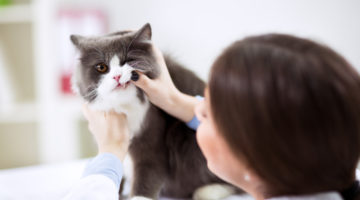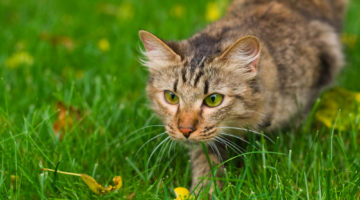Cognitive dysfunction can’t be cured, but it can be slowed down and managed with nutrition and lifestyle changes.
If you have an older kitty, you may have noticed a few changes in his behavior. Perhaps he’s more vocal than he used to be, occasionally acts as if he’s confused or lost, or seems to have forgotten how to use the litter box. Once physical health issues have been ruled out, the diagnosis may be cognitive dysfunction (CD).
People experience mental changes as they age, and so do cats and dogs. We and our animals experience actual neurological changes in our brains as we get older. “The brain loses some mass just as muscles do,” says veterinarian Dr. Nancy Scanlan, adding that CD in senior animals is akin to Alzheimer’s disease in humans.
“Certainly with aging there is a loss of brain cells,” says veterinarian Dr. Vicki Thayer. “Cats are less studied than dogs, but researchers have seen increased amyloid (protein) deposits in the brain that are associated with cognitive dysfunction and probably effects on memory.”
SYMPTOMS AND DIAGNOSIS
There is currently no diagnostic test for CD. Diagnosis relies on anecdotal reports of behavioral changes and the exclusion of other possible causes for the changes. These behavioral signs often include loss of litter box training, a general sense of seeming “lost” at home, an inability to find the food bowl, an increase or decrease in appetite, an avoidance of once favorite foods, and increased nighttime vocalization.
NUTRITION AND SUPPLEMENTS CAN HELP
Cognitive dysfunction is progressive and has no cure. After it has been diagnosed, treatment usually involves learning how to positively manage it so the cat will have a higher quality of life. From a conventional medical perspective, there is no drug treatment approved for cats, although canine medications have been cautiously used in some cases.
Research in humans and dogs has shown that diets enriched with antioxidants and essential fatty acids reduced amyloid production and improved cognitive function. These benefits are presumed to carry over in cats.
“Nutrition is the basis for many of our tissue biochemical pathways and cycles,” says Dr. Thayer. Nutrients necessary for increased cognitive function include potassium, vitamin D, B1 and B6 and manganese. “SAM-e has also been studied to help treat cognitive dysfunction in dogs and cats,” adds Dr. Thayer. “Give supplements that increase circulation and decrease inflammation, such as antioxidants, and support mitochondria with CoQ10,” says Dr. Scanlan. “Avoid artificial flavors, colors and preservatives in food.”
Be sure to work with a holistic or integrative veterinarian before giving your cat any supplements, so you can ensure he receives the right products and dosages for his individual requirements.
DISH – AN ACRONYM THAT DESCRIBES THE SIGNS OF CD
Disorientation. The cat appears lost, disoriented or confused in his own home and may no longer recognize family members.
Interactions. Affected cats may prefer to stay by themselves. There is a decline in social interactions with people or other family animals.
Sleep changes. The cat may sleep longer during the day and elicit “lost” behaviors at night, often with increased vocalization.
House soiling. Affected cats often forget their litter box training or where the litterbox is located. They also tend to groom themselves less.
LIFESTYLE CHANGES
- For a cat experiencing accidents because he cannot find the litterbox, the simple act of relocating it near where the cat spends most of his time will help. Sometimes, a senior cat may just forget “to go”, so periodically taking him to the litterbox may act as a reminder. Since CD affects older cats, increasing the number of litterboxes in the home is helpful; this way, they don’t have to remember the way to the only box.Remember to use positive reinforcement and not punishment during the retraining period. The cat may not learn everything you expect him to, but at least the time you spend together is loving and rewarding, and that helps strengthen your bond and improve the cat’s quality of life.
- Refrain from making a lot of environmental changes in the home, such as rearranging the furniture.
- A calm, regular everyday routine helps reinforce the cat’s sense of place and reduces that “lost” feeling.
- It’s expected that older cats, including those with CD, will slow down and sleep more, but it is important to provide at least a moderate level of exercise and mental stimulation.“To slow CD, enrich your kitty’s environment with toys and games like chase the light, or hiding treats in boxes,” says Dr. Scanlan. “Cats with active minds have more nerve connections. This gives them some extra brain function that can serve as a ‘backup’ system.”
Thanks to improved nutrition, veterinary medicine and lifestyle management, cats are living longer. We therefore see age-related cognitive dysfunction more often than we used to. Though it can’t be cured, it can be successfully managed, delayed and perhaps even prevented with a nutrient-rich diet, antioxidant supplements, an enriched environment, and regular exercise and mental stimulation. Implementing these factors as early as possible in your cat’s life will help ensure he stays mentally sharp well into his golden years.







No Comment